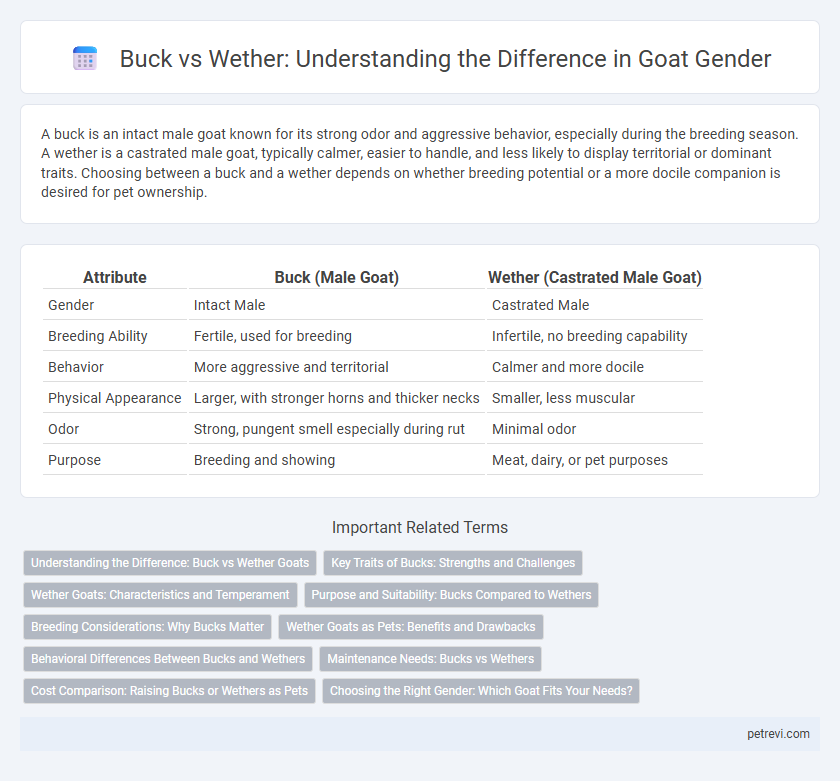A buck is an intact male goat known for its strong odor and aggressive behavior, especially during the breeding season. A wether is a castrated male goat, typically calmer, easier to handle, and less likely to display territorial or dominant traits. Choosing between a buck and a wether depends on whether breeding potential or a more docile companion is desired for pet ownership.
Table of Comparison
| Attribute | Buck (Male Goat) | Wether (Castrated Male Goat) |
|---|---|---|
| Gender | Intact Male | Castrated Male |
| Breeding Ability | Fertile, used for breeding | Infertile, no breeding capability |
| Behavior | More aggressive and territorial | Calmer and more docile |
| Physical Appearance | Larger, with stronger horns and thicker necks | Smaller, less muscular |
| Odor | Strong, pungent smell especially during rut | Minimal odor |
| Purpose | Breeding and showing | Meat, dairy, or pet purposes |
Understanding the Difference: Buck vs Wether Goats
A buck goat is an intact male, typically used for breeding, characterized by prominent scent glands and a more aggressive temperament, while a wether is a castrated male goat often kept as a pet or for milk production due to its calmer nature. Bucks develop stronger musky odors during mating season, whereas wethers lack these hormonal influences, resulting in milder behavior and smell. Understanding these distinctions is crucial for goat management, breeding decisions, and selecting the appropriate goat type for farming or companionship purposes.
Key Traits of Bucks: Strengths and Challenges
Bucks are male goats known for their robust strength, dominant behavior, and strong territorial instincts, making them valuable for breeding but requiring careful management. Their scent glands produce a strong odor, especially during the breeding season, which can be challenging in confined spaces. Bucks also display aggressive tendencies that demand experienced handling to ensure the safety of other goats and caretakers.
Wether Goats: Characteristics and Temperament
Wether goats are castrated males known for their calm and friendly temperament, making them ideal pets and companions in mixed herds. Unlike bucks, they do not exhibit strong odor or aggressive behaviors during the breeding season, which contributes to a more peaceful environment. Their docile nature and manageable size also make wether goats suitable for beginner goat owners and small-scale farming.
Purpose and Suitability: Bucks Compared to Wethers
Bucks are intact male goats primarily used for breeding due to their ability to reproduce, exhibiting natural behaviors and secondary sexual characteristics like larger size and horns. Wethers, castrated males, are preferred for purposes such as managing temperament, improving meat quality, and simplifying herd dynamics, as they tend to be more docile and easier to handle. Suitability depends on the farm's goals, with bucks ideal for genetic improvement and wethers favored in meat production or as companion animals.
Breeding Considerations: Why Bucks Matter
Bucks play a crucial role in goat breeding due to their ability to sire offspring and influence genetic traits within a herd. Unlike wethers, which are castrated males and cannot reproduce, bucks contribute to herd diversity, growth, and improvement of desirable characteristics such as milk production, size, and temperament. Effective management of bucks, including health monitoring and controlled breeding practices, ensures optimal genetic outcomes and overall herd productivity.
Wether Goats as Pets: Benefits and Drawbacks
Wether goats, castrated males, are popular as pets due to their calm temperament and reduced aggression compared to bucks. They typically require less management and do not emit strong odors, making them suitable for small farms and homesteads. However, wethers may be prone to obesity and need regular hoof care, so responsible pet owners must balance their care to maintain health and well-being.
Behavioral Differences Between Bucks and Wethers
Bucks exhibit more aggressive and territorial behavior due to higher testosterone levels, often marking their space with strong odors and engaging in head-butting. Wethers tend to be calmer, more social, and easier to manage, making them ideal for pet or dairy environments. Understanding these behavioral differences helps in proper farm management and ensuring safety.
Maintenance Needs: Bucks vs Wethers
Bucks require more intensive maintenance compared to wethers due to their strong odor caused by scent glands, which necessitates frequent cleaning and ventilation to manage smell. Wethers are easier to maintain as they lack the pungent scent and aggressive behaviors of bucks, making them suitable for smaller or suburban environments. Both genders need regular hoof trimming and balanced nutrition, but bucks demand extra care during breeding seasons to manage their health and territorial instincts.
Cost Comparison: Raising Bucks or Wethers as Pets
Raising bucks as pets generally incurs higher costs due to their need for specialized fencing and increased management to control aggressive or breeding behaviors. Wethers, being castrated males, typically require less maintenance and pose fewer risks, resulting in lower veterinary and housing expenses. Owners seeking cost-effective pet goats often prefer wethers for their calmer temperament and reduced resource demands.
Choosing the Right Gender: Which Goat Fits Your Needs?
Choosing the right goat gender depends on your specific needs such as breeding, meat production, or companionship. Bucks, or male goats, are valued for their breeding capabilities and higher muscle mass, making them ideal for meat production, but they require careful management due to their strong odor and aggressive behavior. Wethers, castrated males, are generally calmer, easier to handle, and better suited for pets or fiber production, offering a practical choice for hobby farmers and small-scale goat keepers.
Buck vs Wether for Goat Gender Infographic

 petrevi.com
petrevi.com